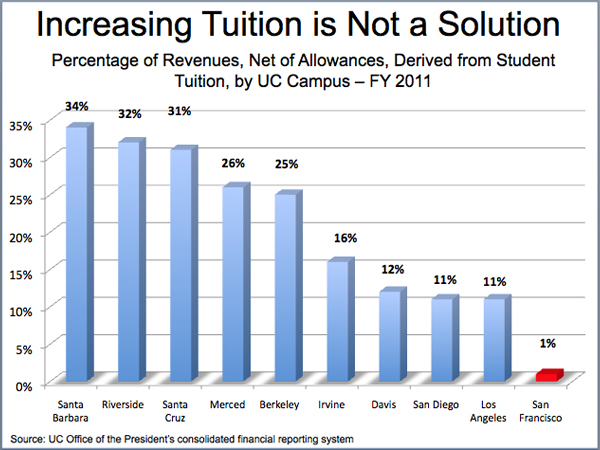On January 19th, UCSF Chancellor Susan Desmond-Hellmann floated a plan to the UC Regents to identify new funding sources for her campus. From the announcement:
“UCSF Chancellor Susan Desmond-Hellmann, MD, MPH, proposed to the University of California Regents on Jan. 19 that a small working group be formed to help UCSF explore options to secure its financial future so it can realize its vision to become the world’s preeminent health sciences innovator.”
The Chancellor’s full statement is available at: http://www.ucsf.edu/news/2012/01/11323/chancellor-proposes-new-approach-secure-ucsfs-financial-future
This news has taken most people, including “insiders”, by surprise. There is much speculation about the Chancellor’s announcement. Is it a genuine desire to ultimately quit the UC system and transform UCSF into a fully privatized corporation, or, less radically, to renegotiate governance and finance policies with the UC? Fortunately, the Chancellor’s statement (above) suggests it is more of the latter.
Nevertheless, the announcement is a cause for serious concern for anybody who opposes the privatization of the UC.
There is concern that the UCSF strategy could serve as a tempting model for Chancellors at the better-endowed campuses, beginning with Berkeley. As the UC system as a whole grinds through these wrenching financial times, the relatively better off institutions have complained that their resources are in effect “subsidizing” their less affluent counterparts. There is ample evidence that this is not accurate–in fact, others have shown that it is the less costly, high enrollment units such as the Humanities and Social Sciences that “subsidize” the “hard science” departments. Still, the UCSF announcement must surely prick the ears of those campuses and units that feel aggrieved by prevailing governance and financial policies. It is not far-fetched to fear that some of them might relish the opportunity to strike out on their own on the strength of their external funds and grants. They might well emulate the UCSF strategy of threatening to bolt unless UCOP agrees to let them keep more of their large external revenues for themselves.
Bolting the UC might work for the UCSF because it is purely a medical school with no undergrads or Humanities or Social Science Divisions. UCSF has no shortage of external funds to sustain it and looks forward to even more private funds in the future. Although the UCSF pays its share of “tribute” or “taxes” to the UC system, the school is actually not embroiled in the daily preoccupations of UCOP. Its funds, however, are essential to the functioning of the UC system. Without its share from the external funds that professional schools such as UCSF and “hard science” Divisions annually bring in, it is clear that the UC could not survive.
This is the corrosive logic of “privatization” at work: take your money and run. If medical, engineering, and biology Divisions make similar claims at other campuses, they would gut the UC system and cripple the Humanities and Social Science Divisions. The UC is a world-class university not only because of its prominent contributions to medical, engineering or biological knowledge. Its fame also hinges on the excellence of its contributions to the humanities and social science. The UC has thrived for decades because its resources have been pooled and used to fund excellence across the board. The UCSF announcement now threatens to unravel a model based on cooperation, cross-cutting support and mutual gain.
If a war of attrition gains traction and well-endowed, grant-rich units take their money and run, how impervious will the Humanities and Social institutions prove to be? Will a grant-rich Sociology department demand the right to preferential treatment? Would a relatively well-endowed campus such as Berkeley refuse to “subsidize” UC Merced? If a possible departure by UCSF is upheld by the courts (and many legal questions would need to be resolved), could Berkeley also quit the union on similar grounds?
Ivan Evans President, SDFA ievans@ucsd.edu